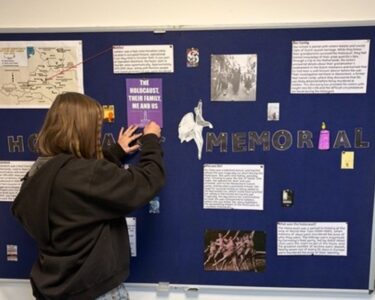In our Pedagogical Focus for this edition, we are examining the use of film and documentaries as a medium when teaching the Holocaust. With a new generation of cinematic works and streaming content available, teachers now have unprecedented access to a range of materials which could be used in the classroom.
Contemporary films such as The Zone of Interest (2023), Jojo Rabbit (2019), and Son of Saul (2015), to name but a few, represent a growing standard of Holocaust storytelling that speaks directly to today’s students. These films bring new artistic approaches, diverse cultural perspectives, and innovative narratives to a subject that can often feel distant in a textbook.
Films like Son of Saul, with its intense first-person camera work and refusal to offer easy closure, force students to confront the chaos and horror of the camps in a deeply personal way. However, that is not to say that emotive films like Son of Saul should be used in every classroom. Further to the limitations surrounding age-rating (Son of Saul is a ‘15’) the film’s claustrophobic camera work which confronts the often-graphic scenes of destruction, mean that this film is only suitable for older year groups.
Jojo Rabbit (age rating – 12) by contrast, uses satire and dark comedy to dismantle the absurdity of Nazi ideology while exploring themes of indoctrination and moral awakening. The use of satire and the comedic approach of the film can be confusing for students; “Should I laugh?” is a question often phrased when watching this film. However, the film combines parody with the brutal reality of life under the Nazi regime, to create a thought provoking and powerful take on issues such as friendship, trust and morality, issues which our students may often face in contemporary society.
The Zone of Interest (age rating – 12) takes a chillingly clinical look at the banality of evil through the quiet domestic life of a commandant’s family living next to Auschwitz. It moves away from the ‘traditional’ prism of Holocaust film; showcasing the victims and the graphic nature of the camp system, but rather, the ‘fly on the wall’ method of detached cinematography arguably creates a more shocking revelation of the ‘normality’ felt by the perpetrators of the crimes of the Nazi regime. Topics such as perpetration are difficult to teach, with many students struggling to understand the complex nature of decision making and the oft-detached nature of those who made these bureaucratic choices. The use of films such as Zone of Interest can provide an insight into the banality of evil, in a way that Hannah Arendt may have found useful.
These films, in their different ways, engage students emotionally and intellectually, allowing them to grasp not only the historical facts but the human dimension of genocide, complicity, and resistance. They provide a medium for empathy, introspection, and moral questioning, tools essential for cultivating responsible global citizens.
However, teachers must navigate these works thoughtfully. The use of fictionalised or stylised narratives can raise questions about historical accuracy, emotional readiness, and interpretive context. Films may unintentionally sensationalise trauma, risk simplifying complex issues, or provoke emotional reactions that require careful classroom support.
Educators often supplement film screenings with guided discussion, historical background, and ethical reflection to ensure students interpret what they’re seeing through an informed and sensitive lens. The goal is not just to watch these films, but to use them as springboards for critical thinking and deeper learning.
Documentary as Evidence and Interpretation
In contrast to fictional films, documentaries provide a factual foundation and often centre the voices of survivors, historians, and primary source materials. Recent titles such as Simon Schama’s The Road to Auschwitz (BBC), My Family, the Holocaust and Me (BBC) Netflix’s The Devil Next Door, and the streaming adaptation of Christopher Browning’s Ordinary Men (Netflix) offer accessible, engaging entry points for secondary school students.
Many of our alumni community will be familiar with The BBC documentary series My Family, the Holocaust and Me, presented by Robert Rinder, which offers a compelling and deeply personal exploration of Holocaust history through the lens of British Jewish families uncovering their relatives’ pasts. This two-part series serves as a valuable educational resource for teachers aiming to provide students with a nuanced understanding of the Holocaust.
The series humanises the historical narrative by focusing on the individual family stories of Rob, Angela, Bernie, Noemie, Louisa and Natalie and making the vast and often abstract events of the Holocaust more relatable to students. By following the participants as they trace their relatives’ experiences, students can engage with the material on an emotional level, fostering empathy and a deeper connection to the subject matter. The documentary’s format encourages critical thinking and personal reflection, prompting students to consider the impact of historical events on individual lives and communities. Furthermore, My Family, the Holocaust and Me serves as a powerful tool for teachers when integrated into classroom settings through initiatives like #HtFMeUs, enhancing students’ understanding of history, promoting empathy, and encouraging critical reflection; a valuable tool when reflecting on contemporary educational.
The Road to Auschwitz combines personal reflection with historical narrative, tracing both Schama’s family history and the broader machinery of the Holocaust. Ordinary Men confronts the troubling psychology of participation in genocide—how average individuals became perpetrators—challenging students to think about power, conformity, and moral choice. The Devil Next Door explores the trial of John Demjanjuk and the controversies surrounding Holocaust memory, justice, and the limits of historical evidence.
Students can learn to distinguish between primary and secondary sources, evaluate and analyse perspective, and appreciate how visual media shapes public memory. Documentaries also help contextualize the fictional films they may view in class, offering clarity and reinforcing facts.
Still, documentaries are not without challenges. Their emotional weight can be profound, particularly when they include graphic imagery or harrowing testimony. Schama’s often graphic account of the Holocaust in Lithuania is shocking, and thus teachers must prepare students for this material and provide space for reflection and processing. Additionally, the narrative framing of a documentary, who, why and what, can influence interpretation – an important point for classroom analysis.
Conclusion: An Evolving Classroom Conversation
Whether through the satirical take of Nazi Germany in JoJo Rabbit or the sobering testimonies in The Devil Next Door, and My Family, the Holocaust and Me, the use of film and documentary in Holocaust education can help students engage with history in meaningful and memorable ways. Films must be carefully selected for age-appropriateness and historical accuracy and always contextualised within a broader curriculum that includes reading, research, and discussion. These tools, when used responsibly and thoughtfully, can support a deeper understanding of the Holocaust, not only as a historical event, but as a warning, a lesson, and a call to moral awareness.
As our alumni community reflect on their own experiences with Holocaust education, many of you will recall a moment – perhaps a scene, a testimony, a photograph – that made the enormity of the tragedy real to you as a student, and/or as an educator. As always, your views are central to these newsletters, and as a result we would love to hear from you regarding your experiences using film and/or documentaries in the classroom.
We would be very grateful if you could take 2 minutes to complete three short Menti questions.
You can choose from the following three formats (enter the relevant code on the Menti website):
- Multiple choice (7213 4095)
- Word cloud (8765 5792)
- Open text (2646 1716)



